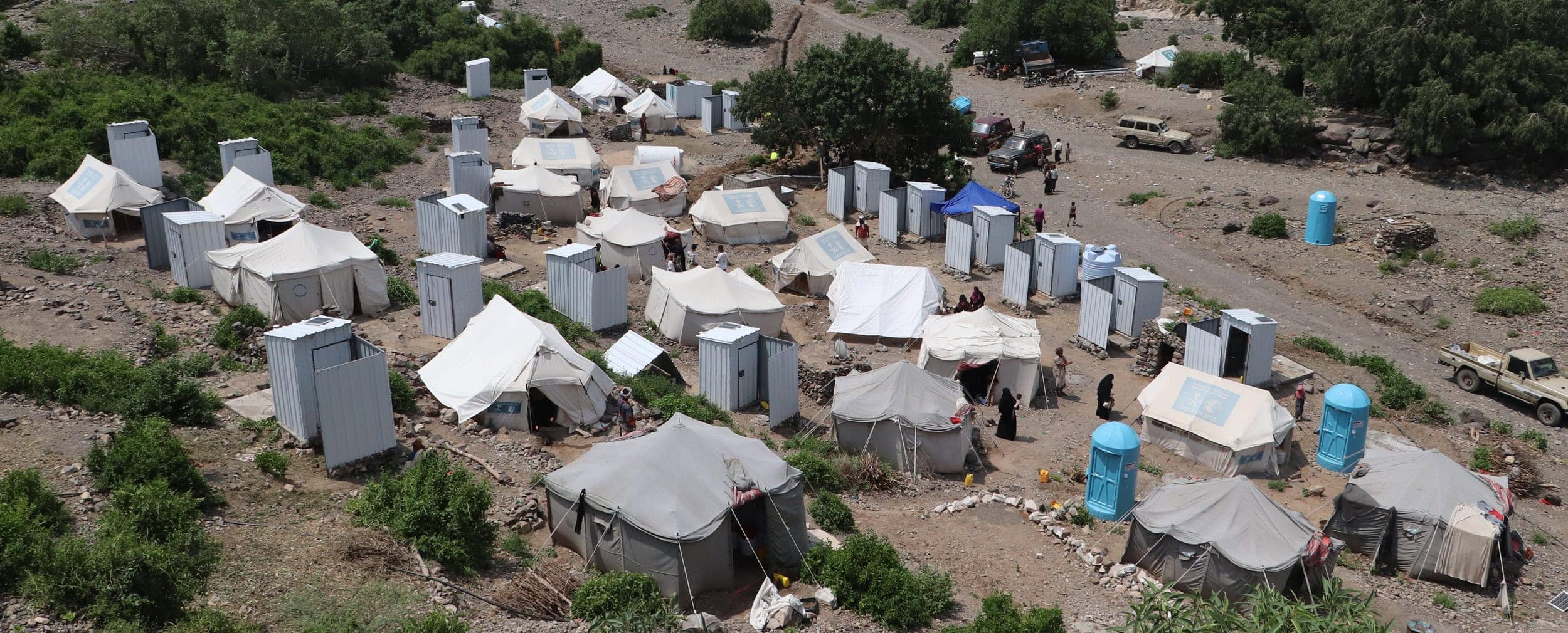
A camp for people displaced due to the war in the Qareen area of Al-Musaymir District, Lahj Governorate, South Yemen, September 13, 2025 (South24 Center).
12-10-2025 at 10 AM Aden Time

|
|
“Life in the camp is extremely difficult. Amid the searing heat, we prepare our meals over a wood-burning stove. On rainy nights, we are left with no option but to sleep hungry, us and our children.”
Ansam Abdullah (South24)
The car set off with the first rays of sunlight from the center of Lahj Governorate, the city of Al-Houta, at six-thirty in the morning. The road stretching toward the farthest point in Al-Musaymir District was arduous—towering mountains and exhausting curves, ascending and descending for continuous hours. Our destination was the "Qareen" camp for internally displaced persons (IDPs), those forcibly uprooted from their villages by Houthi militias along the border areas adjacent to Mawiyah in Taiz Governorate.
Each turn in the road deepened our resolve to reach the camp, where the stories of hundreds of families awaited -- families who had abandoned their homes and lands under direct shelling. The journey felt like a passage into another world, a world that encapsulates the meaning of forced displacement and the scars it leaves on human lives.
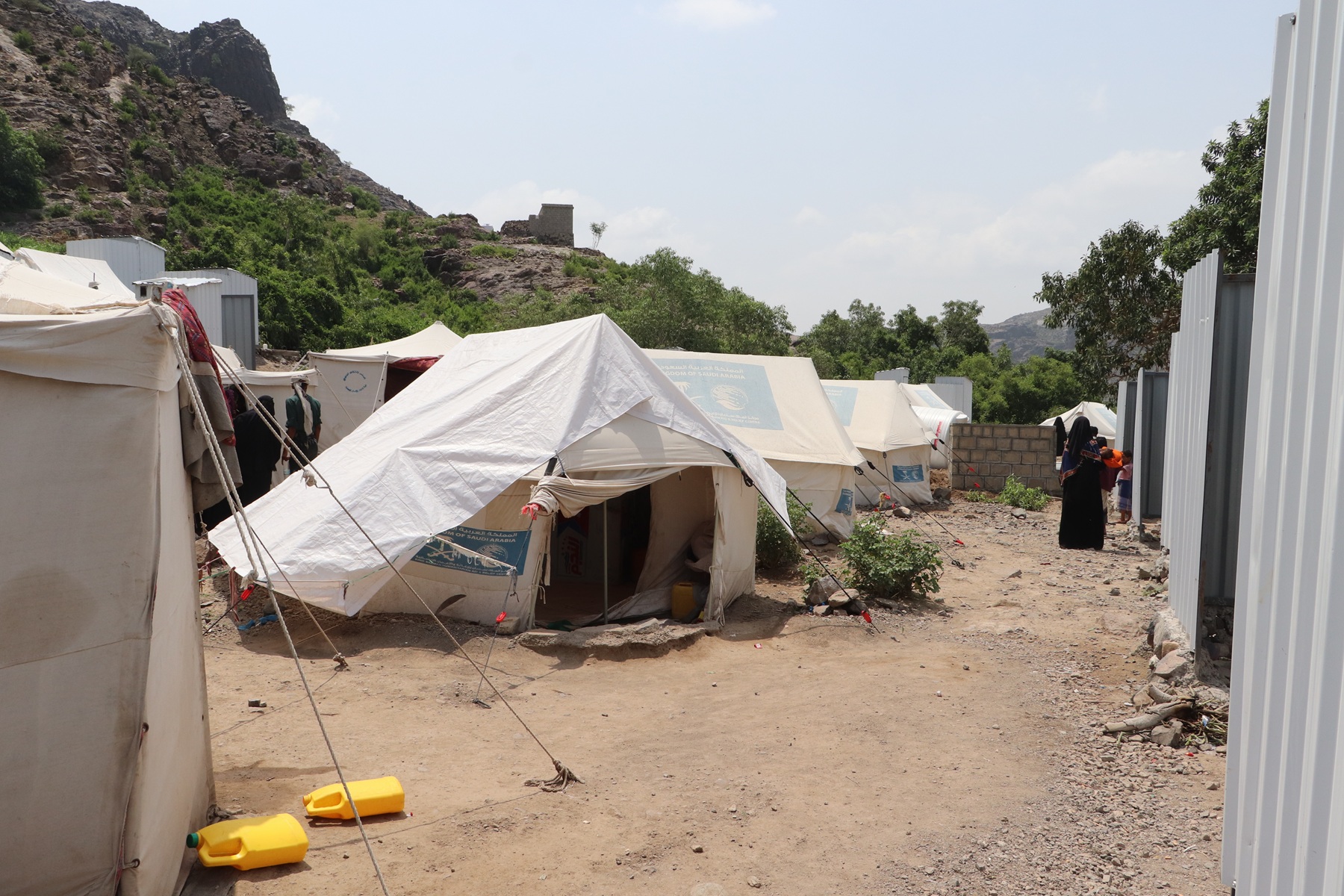
Tents for displaced persons in the camp, September 13, 2025 (South24 Center)
Upon arrival at midday, the scene resembled a canvas of human suffering: a weary gathering amid makeshift tents that offered no protection from heat or cold, and an almost complete absence of essential humanitarian services, save for sporadic aid arriving from scattered sources. The place bore a striking resemblance to IDP camps in Gaza or northern Syria; the images of suffering repeated, even if the geography differed.
The residents welcomed us with touching warmth, as if our presence offered a rare opportunity to amplify their voices. They gathered around us, each eager to invite us into their tent to witness their hardship firsthand.
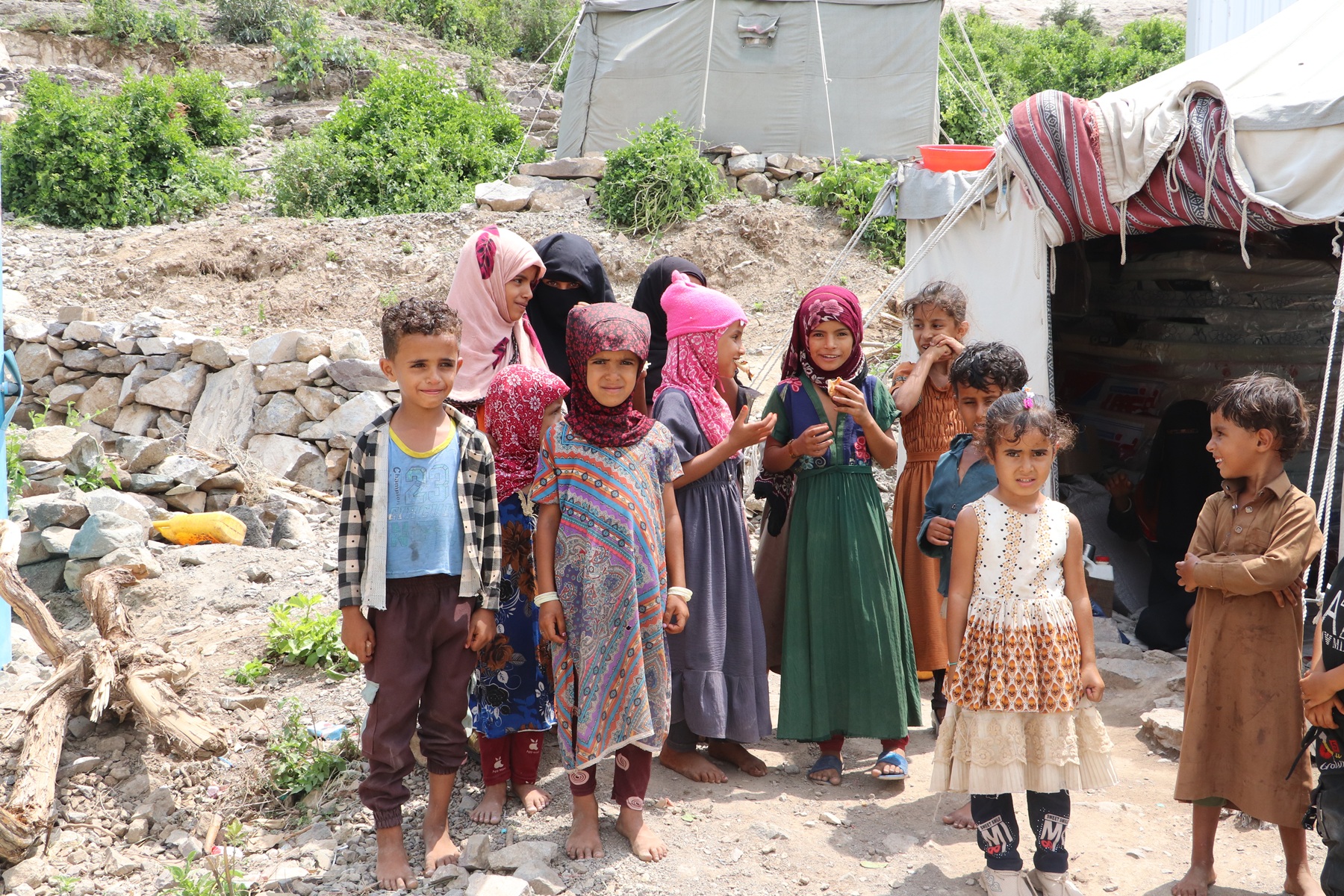
Children at Qareen IDP camp in Al-Musaymir District, Lahj Governorate — September 13, 2025 (South24 Center)
The Beginning of the Story
The ordeal began in early September 2024, when Houthi militias forced hundreds of families from the villages of Jabal Quraysh, Shawkan, Mustadif, Ahamah, and Al-Rahwah in Al-Musaymir District to flee under the threat of shelling and direct targeting, as part of military operations against the Southern Armed Forces.
Suddenly, these families found themselves without homes, agricultural lands, or livestock, their primary sources of sustenance. They left behind grain stalks on the verge of harvest, sheep, bees, and memories of homes reduced to rubble. Since that day, their journey of displacement led them to worn-out tents in the "Qareen" camp, or to nearby valleys and caves for those who could not find a tent to shelter in.
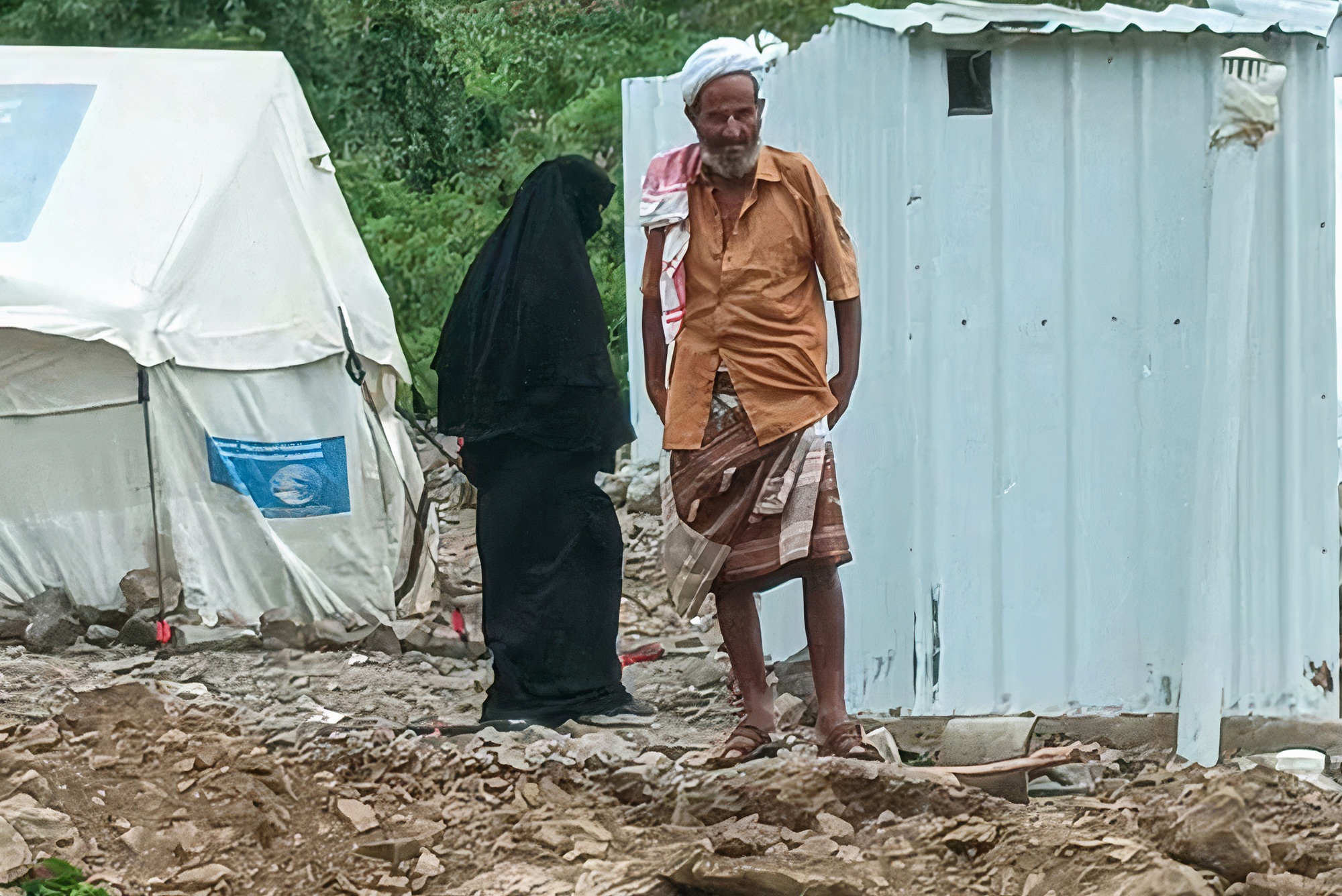
Mahdi Thabet Saleh, a resident of the Qurain camp for displaced persons, September 13, 2025 (South24 Center)
Among the weary faces stood Mahdi Thabet Saleh, a man in his fifties with sorrowful features—a father of eight children and a husband, now a resident of the camp.
Speaking to South24 Center, he recalled the initial moments of displacement:
"Our journey to the camp did not escape the heavy Houthi shelling, and I lost three members of my family."
He glanced at his tent, barely standing against the wind, and added: "Our conditions in the camp are dire. We need new tents and tarpaulins to protect us from heat, rain, and storms. We need urgent relief interventions to cover the most basic necessities of life."
Stories of Suffering
Inside her tent, scorched by direct sunlight, sat Rahima Naji Ghalib, trying to conceal her pain. Her features were worn down by hypertension, yet she recounted her story to South24 Center in a tired voice: "I’ve been living in this worn-out tent for a year, with my husband, my only son, and my husband’s nine children, all of us here."
She extended her hand toward a bundle of firewood beside the tent and continued:
"My blood pressure keeps rising, sometimes reaching 190 over 100, because of the stove’s fire and smoke during cooking. Just yesterday, I lost consciousness for over an hour and only woke to my child’s screams and the voices of women around me trying to revive me. A strip of blood pressure medication costs nine thousand rials, and I cannot afford it."
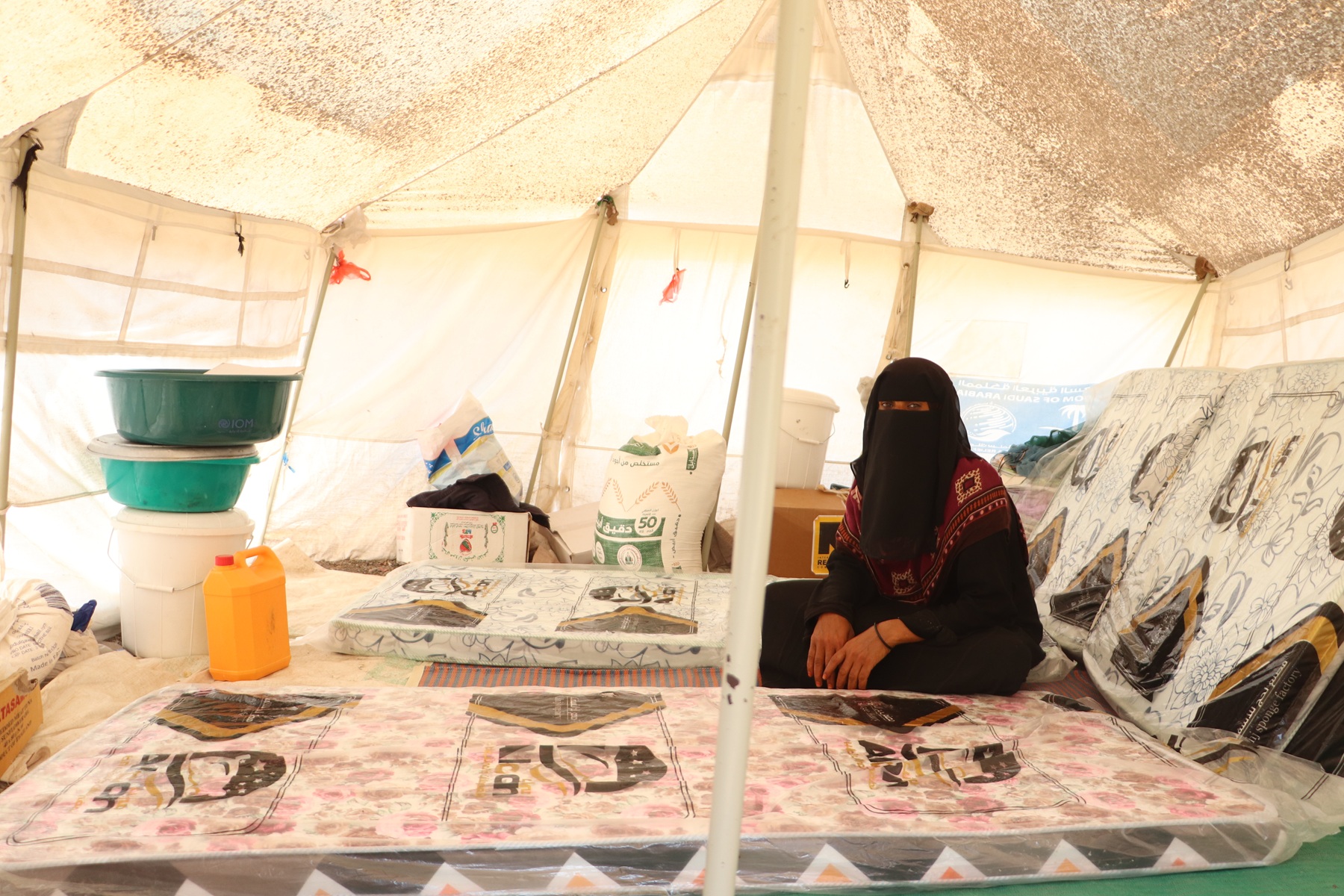
Rahima Naji Ghalib, resident of Qareen IDP camp — September 13, 2025 (South24 Center)
She paused briefly, then pointed to her hand full of cuts:
"We don’t have any cooking tools. We left them all behind when we fled. I have to fetch and break firewood despite my illness, just to cook for my children. We need everything: gas, an oven, even an emergency food basket. We carry water on our heads from a distant valley, and the camp doesn’t have a single water point. We fear the coming winter, as these torn tents won’t protect us from rain and cold."
Then Rahima remembered her home in "Qareen," tears welling in her eyes:
"I used to own sheep and seventy beehives. All of that is gone. The Houthis bombed the sheep and ruined everything. I used to be able to feed my children a yogurt cup for lunch, but today I long for it as a distant dream. We left our farmland heavy with grain near harvest time, but we couldn’t reap anything this season."
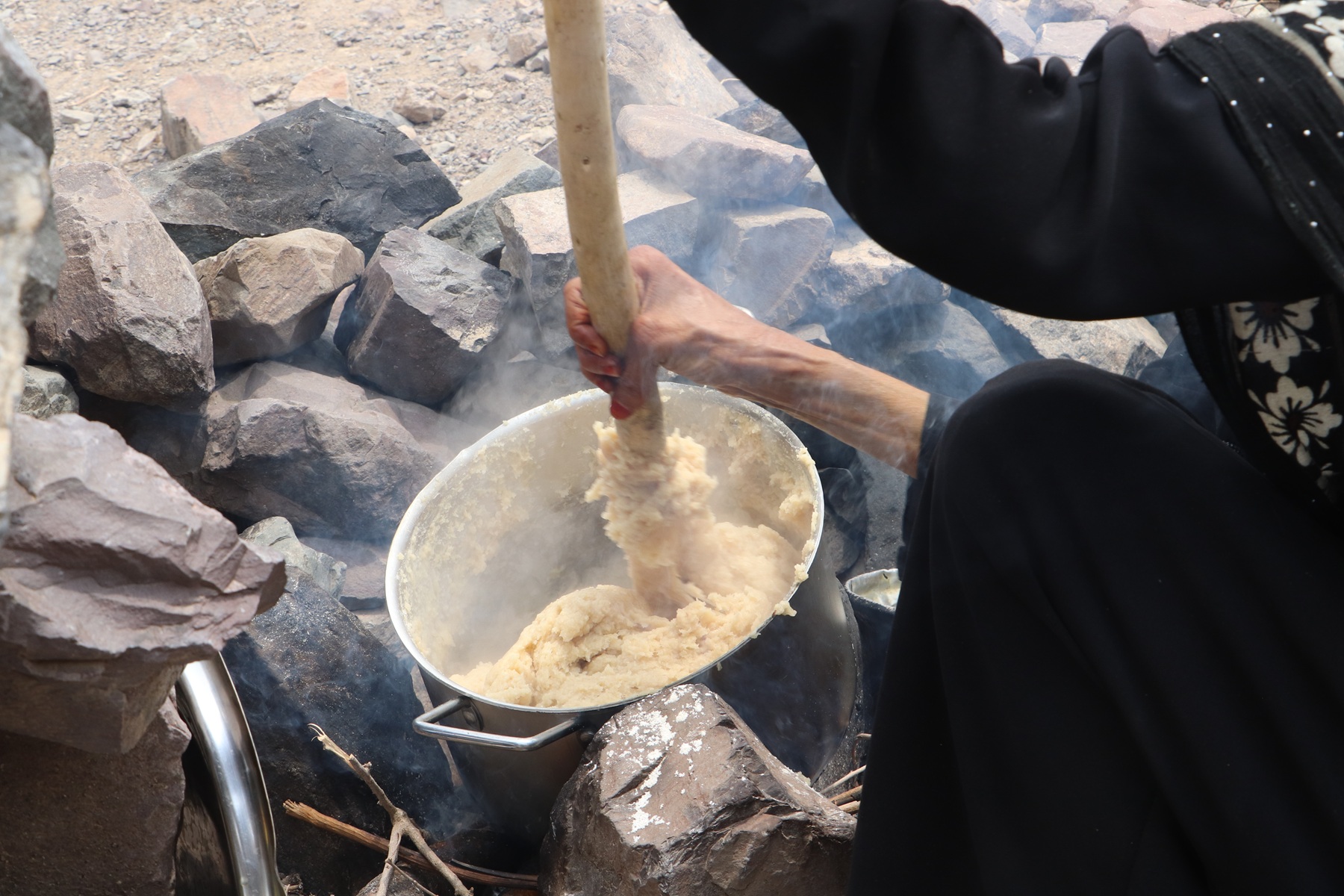
Stone cooking stove at Qareen IDP camp — September 13, 2025 (South24 Center)
She sighed with sorrow and added: "Only half of the displaced families are here in the camp. The others live in nearby valleys and mountains among monkeys. During the heavy rainy season, I still remember how I clung to the tent and my child as water surrounded us from all sides, and the wind tossed us left and right."
She concluded: "Our children are without education, and healthcare is absent. Women here need a trained midwife, as deaths during childbirth are recurring. As for me, I cry every day from embarrassment when I go out to fetch firewood or relieve myself, after having lived in my home with dignity, not having to suffer these harsh conditions."
In another tent within the camp, Fatima Ghalib Saleh sat surrounded by her large family.
She told South24 Center in a voice heavy with fatigue: "I live here with my two married sons as one family, all of us inside the tents. We lack the most basic necessities for a decent life, especially food supplies. The amounts provided by Binaa Development Organization for two months have run out, and I had to sell the sheep I brought from Qareen after risking our lives to retrieve them."
She sighed and continued: "Life in the camp is extremely difficult. Amid the searing heat, we prepare our meals over a wood-burning stove, and on rainy nights, we are left with no option but to sleep hungry—us and our children."
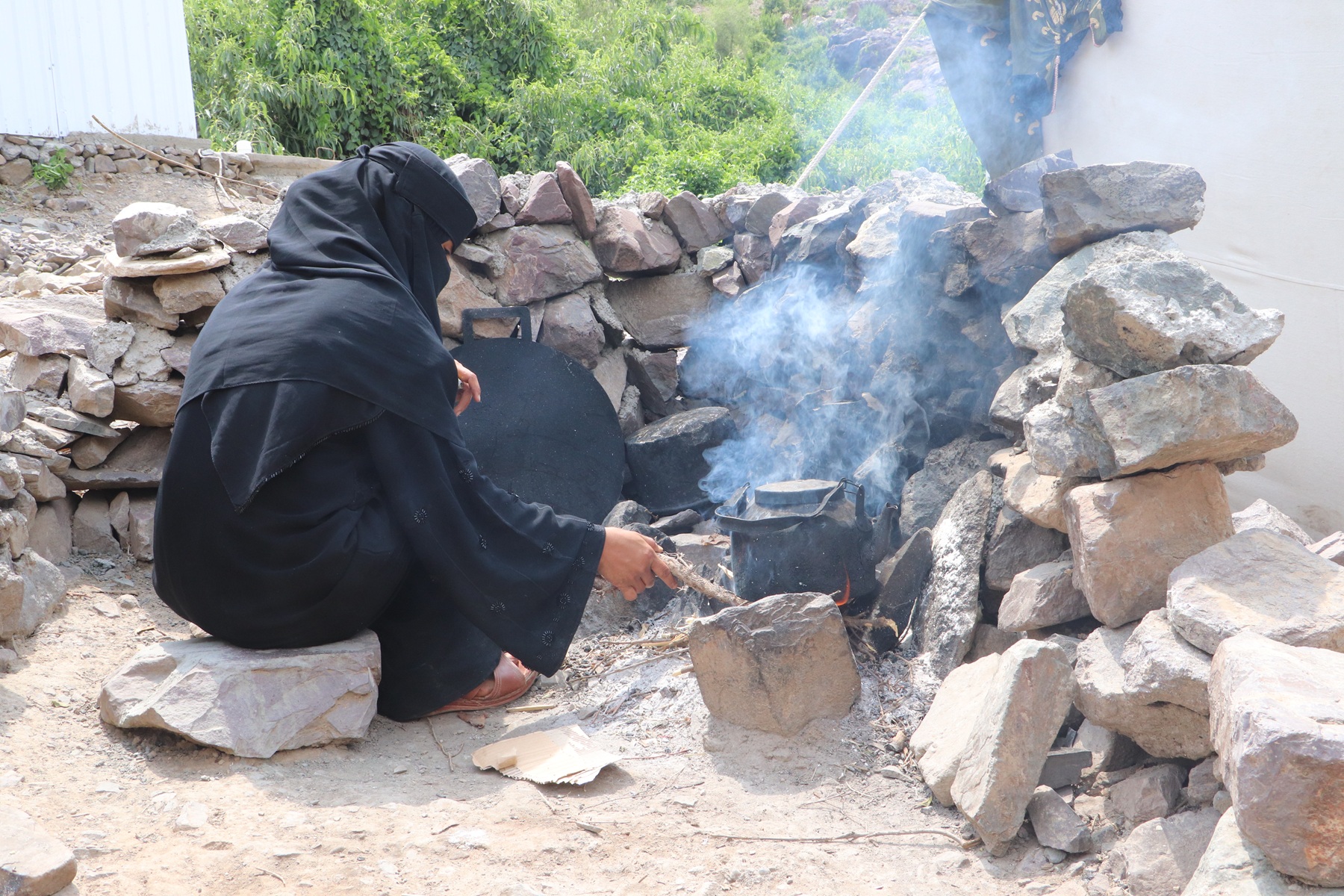
Fatima Ghalib Saleh, resident of Qareen IDP camp — September 13, 2025 (South24 Center)
She added: "We can’t afford to rent or buy houses. We’ve lived a whole year in these tents that no longer suffice. We wish the war would end so we could return to our homes."
Women are the most affected in this camp. As Fatima pointed out, childbirth cases can lead to many complications: "If a delivery becomes difficult, we have to transfer the woman to Ibn Khaldun General Hospital in Al-Houta, despite the hardship and distance. We bear the costs of transportation and treatment, which can reach up to three hundred thousand rials."
She then described the fears surrounding them at night: "Our husbands have to sit beside us every night afraid for our safety and that of our children and to keep us from any harm, which prevents them from seeking work to support us. We also fear wild animals that roam around the camp at night, and their sounds are heard in the dark. We fear snakes and reptiles too, along with mosquitoes and insects. Our life here is nothing like it was in our homes."
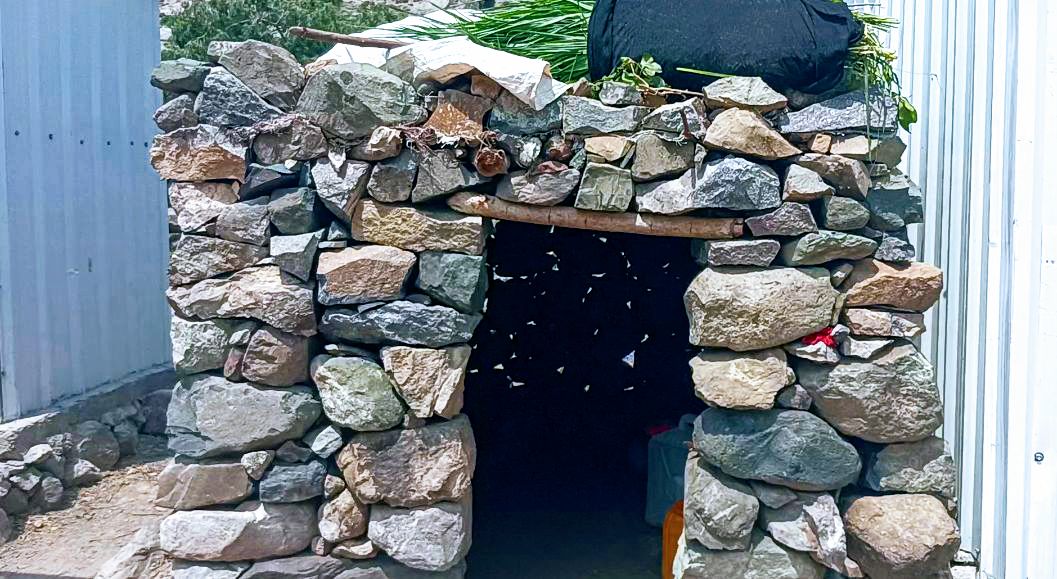
A stone room, Qareen IDP Camp – September 13, 2025 (South24 Center)
Fatima painfully recalled the moment of their escape: "We fled from Houthi shelling inside our homes. Some of our relatives were killed, and we couldn’t even retrieve their bodies. The Houthis demanded twenty-five thousand Saudi riyals for each corpse. As for the wounded, some lost a hand or leg or suffered permanent disabilities."
Among the torn tents, a brave young woman stood out, holding papers and registration forms. She is Asma Saleh Dahan, a high school graduate and mother of two, who has lived near the camp for years but has now become part of it because her family is among the displaced. She volunteers with Binaa Development Organization.
She told South24 Center with a tired smile:
"I work to raise awareness among the displaced about the importance of cleanliness as much as possible to avoid the risks of cholera and other communicable diseases, especially under these camp conditions."
She added: "I issue referral papers for cases of severe malnutrition among children in the camp to the nearest health center in Al-Musaymir city. It’s no secret that the majority of children in the camp suffer from malnutrition."
Asma revealed a more painful aspect: "The elderly are the most affected here. We’ve recorded several deaths among them, men and women, due to the harsh and unforgiving conditions. There’s only a simple pharmacy that provides some emergency medications for fever or colds. Just today, Binaa Development Organization began distributing some medications after previous demands, but not all patient needs are met."
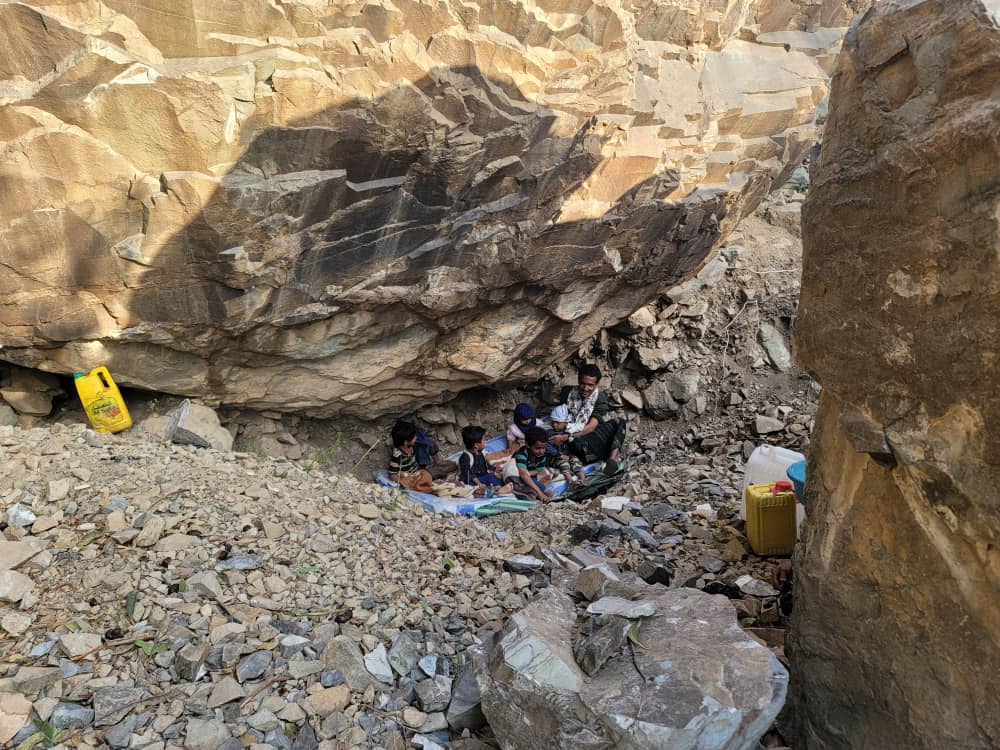
Displaced persons stranded in the mountains without tents – (For South24 Center by Sheikh Ammar Al-Howshabi)
Figures and Statistics
Under the continuing assaults by Houthi militias on the "Qareen" area and its surrounding villages in Al-Musaymir District, 278 families were forced to flee, according to a report by the Community Committee in Wadi Faqeer Al-A‘la and Qareen, chaired by Sheikh Ammar Al-Hawshabi.
The report, obtained by South24 Center, highlights the most urgent needs:
• Anoud Camp contains 70 tents, and Al-Hajf Camp has 30 tents. All are worn out and were distributed a year ago, currently sheltering around 140 families.
• The remaining families are scattered: in caves, valleys, under trees, or hosted by others—but all are in dire need of proper shelter.
• Dozens of families include individuals requiring urgent medical care, among them 13-year-old Naba Qaed, whose condition necessitates treatment abroad.
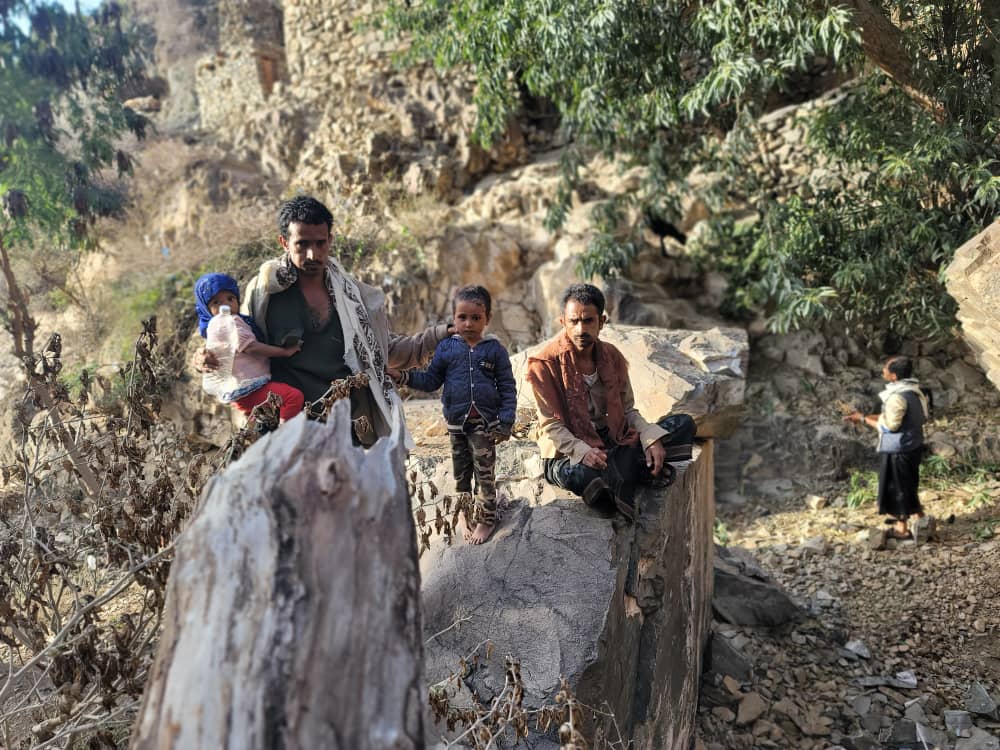
Displaced persons stranded in the mountains without tents (For South24 Center by Sheikh Ammar Al-Howshabi)
• In his statement to South24 Center, Sheikh Ammar Al-Hawshabi appealed to the Presidential Leadership Council, the Southern Transitional Council, the government, and all international and local partners—including organizations, associations, institutions, philanthropists, and businesspeople—for urgent intervention to alleviate the suffering of the displaced.
• He pointed to the approaching winter and the compounded hardship it brings for the displaced, calling for the provision of tents or caravans suitable for human habitation, in addition to food, water, clothing, education for children, and healthcare for the sick.
• Despite a year having passed since the displacement, humanitarian interventions have remained limited and temporary. Some efforts were recorded from government institutions and civil society organizations working in relief, but they were insufficient to meet the needs of the displaced.
• The Yemeni Red Crescent – Lahj Branch was present through the distribution of some shelter aid. The Relief Authority of the Southern Transitional Council also visited the camp and pledged to provide appropriate support. Recently, Binaa Development Organization has made a notable presence by distributing relief and medical aid.
• Omar Al-Samati, Advisor to the Governor of Lahj for Organizations Affairs and Director of the Executive Unit for IDP Camps in the governorate, told South24 Center: "There have been interventions from several organizations and supporting entities, including the distribution of mattresses, blankets, hygiene kits, and cash assistance last week through Binaa Development Organization. However, ensuring continued support remains dependent on available resources."
• Khateeb Ahmed, Director of the Executive Unit for IDPs in Al-Musaymir District, affirmed: ”The displaced are in dire need of new tents and urgent interventions in food and health sectors. Some institutions have intervened previously, but only for a short period and in a limited manner. The displaced need sustained support—they left their homes with nothing."
• Community researcher Safi Haidara Mohsen, who conducts monitoring and verification activities after receiving training from the Binaa Organization for Development (BFD), pointed out that the recent aid was distributed based on registration and verification forms, but it only covered a two-month period.
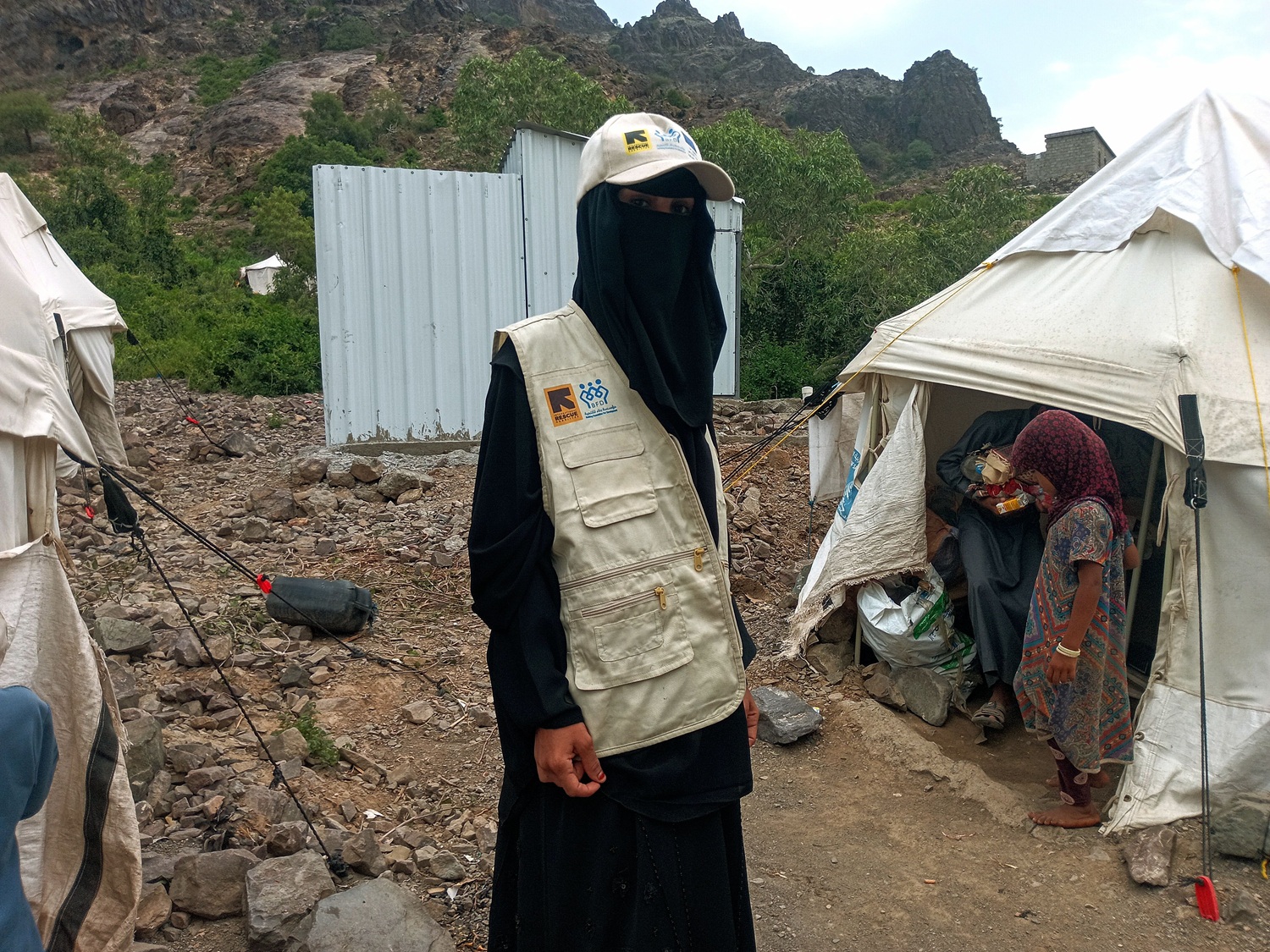
Safi Haidara Mohsen, a community researcher working with the Binaa Organization for Development – September 13, 2025 (South24 Center)
She told South24 Center: “The organization promised to continue support if the work is based on accurate data that includes all eligible individuals, with plans to later expand assistance to other sectors. We hope the conditions of the displaced will improve through increased support and meeting their basic needs.”
Extended Suffering
The story of the "Qareen" camp is but a microcosmic reflection of a much larger tragedy. According to the United Nations’ 2025 Humanitarian Response Plan, approximately 19.5 million people in Yemen are in need of humanitarian assistance, while 4.8 million internally displaced persons (IDPs) endure inhumane conditions across various regions of the country.
More than 17 million individuals suffer from food insecurity, while one in every two children under the age of five faces acute malnutrition. Meanwhile, nearly 40% of healthcare facilities are either non-operational or functioning only partially.
These harrowing statistics place the tragedy of "Qareen" at the heart of a broader humanitarian crisis, rendering internal displacement one of the most devastating consequences of the armed conflict on Yemeni society.
Lahj Governorate itself ranks among the most affected by internal displacement from northern Yemeni provinces, hosting numerous camps such as the main Al-Rabat camp. The crisis is not limited to Yemeni nationals alone; Lahj also accommodates Yemen’s largest refugee camp for African asylum seekers—Kharaz Camp.
Delayed Hope
As our departure time approached, the displaced residents insisted on sharing a modest lunch with us. They cooked for us from the few sheep they owned—a gesture that embodied generosity and dignity, defying the cruelty of forced displacement for an entire year. It was the last vestige of social cohesion they were striving to preserve amid loss and devastation.
We left the camp with their eyes following us with silent pleas. They entrusted us with urgent demands that cannot be postponed:
• Provision of adequate shelter materials, including new tents, to ensure coverage for all displaced families before the onset of winter
• Securing humane shelter for families living in the valleys and mountains without protection.
• Implementation of a fair and regular monthly distribution of food assistance baskets to all affected households
Establishment of a mobile health unit to deliver essential healthcare services to camp residents and populations living in caves and remote mountainous regions.
The "Qareen" camp in Al-Musaymir is not merely a gathering of displaced persons—it is a stark embodiment of the ramifications of forced internal displacement due to a war in which dozens have been killed or wounded, and homes, farms, and livestock have been lost, and the most basic necessities of life have vanished. Children are left without education, women without care, and families cling to the hope of a tent to shield them from the cold—or a chance to return to their land.
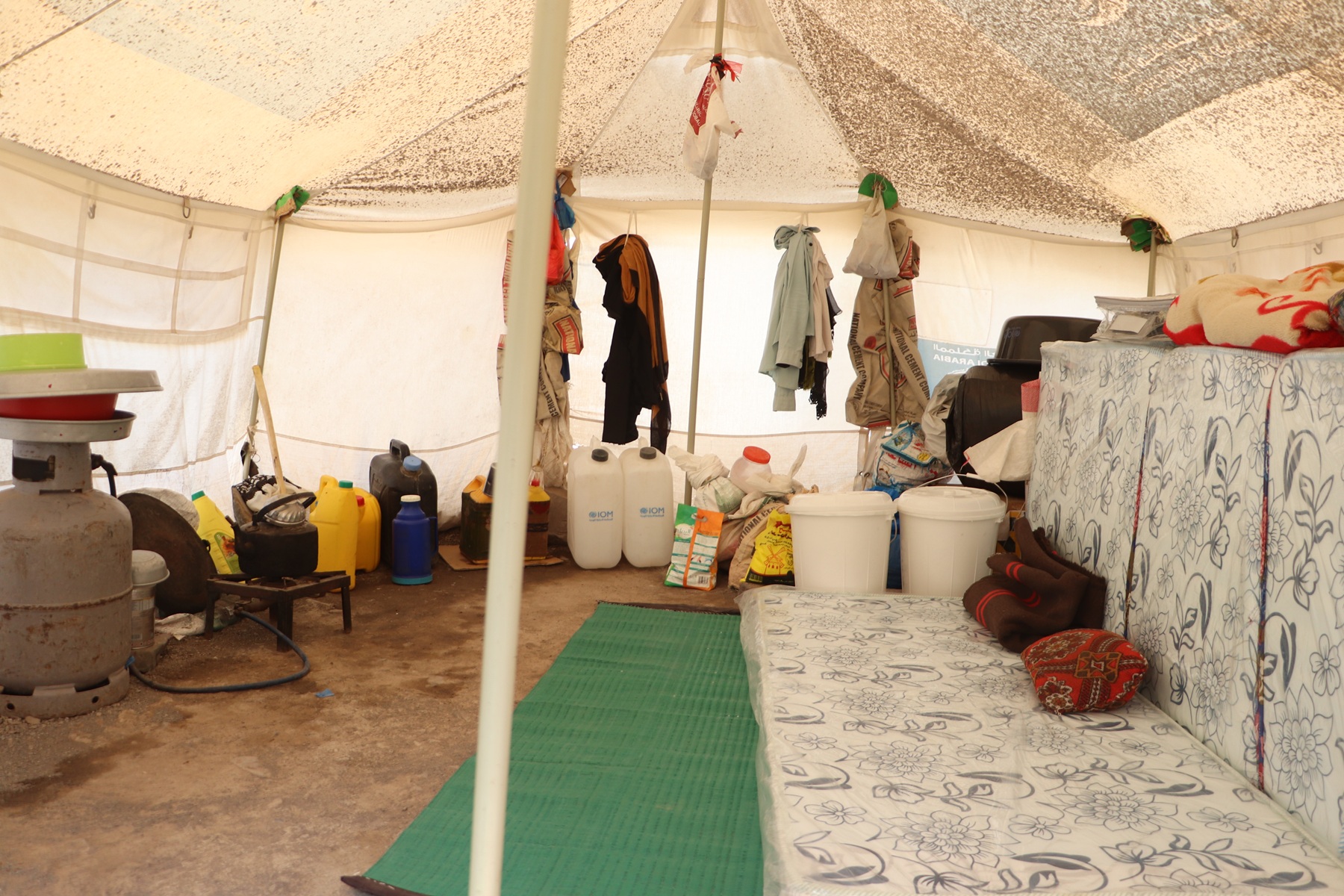
Inside one of the tents in the camp – September 13, 2025 (South24 Center)
In this place torn between waiting and fear, the displaced embody the essence of survival amid chaos, with no support but their patience and a faint hope that their voices might reach someone capable of extending a helping hand.